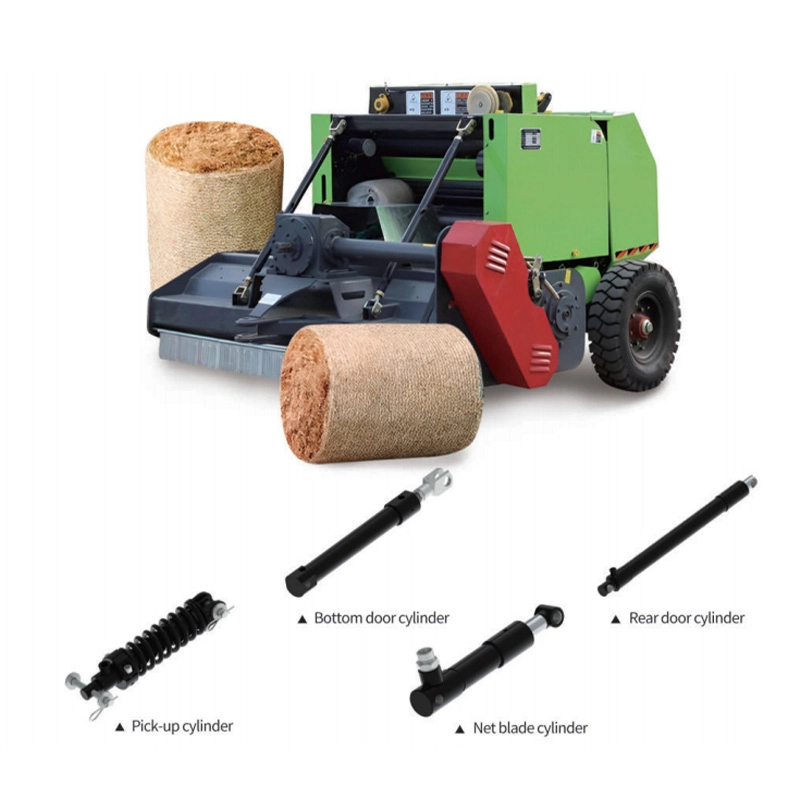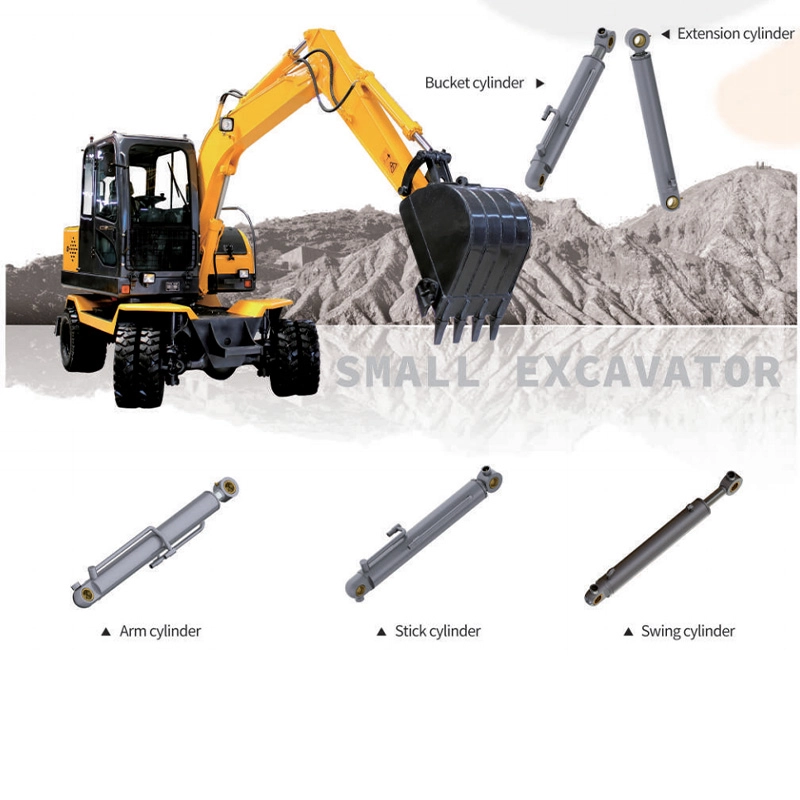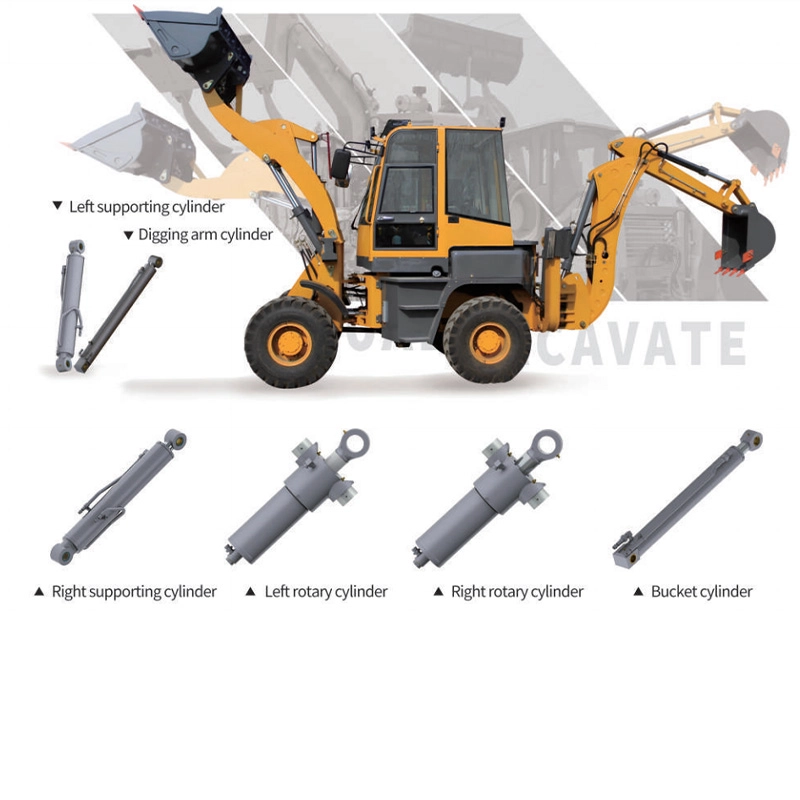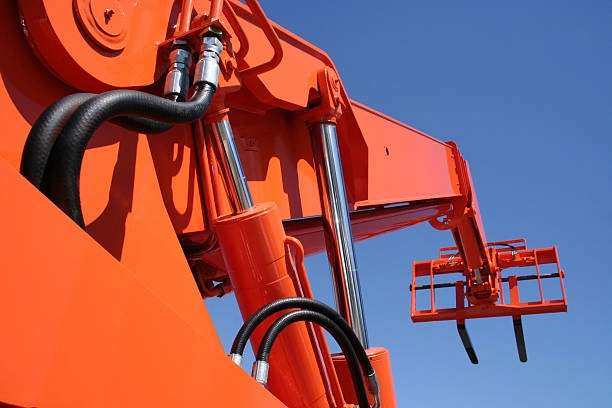
The Importance of Hydraulic Cylinders in Tractor Performance
Key Functions of Hydraulic Cylinders in Tractors
Hydraulic cylinders are super important for how tractors work. These parts turn liquid power into straight movement. So, tractors can do lots of jobs well. For instance, they lift and lower heavy stuff in a front loader attachment. They do it with great care. Also, they help with steering by giving the force to turn wheels easily. Hydraulic cylinders make steady, careful movements. This makes them a must-have for farm machines.
Benefits of High-Quality Hydraulic Cylinders for Agricultural Efficiency
Getting top-quality hydraulic cylinders really helps farm work. Good cylinders keep things running smoothly. This means less time fixing broken stuff. They can carry heavier tools and attachments, too. Plus, high-quality cylinders stop liquid from leaking out. So, they work great and save money on repairs. Their strong designs handle tough farm conditions well. They don’t wear out quickly.
Choosing the Right Hydraulic Cylinder for Your Tractor
Factors to Consider When Selecting Hydraulic cylinder for agricultural machinery for Sale
Picking the best hydraulic cylinders for sale takes some thought. First, figure out how much weight the cylinder needs to lift. Also, check how far it should move. This is called stroke length. The pressure range is another big deal. It needs to match your tractor’s hydraulic system. Also, think about the mounting style—like clevis, flange, or trunnion. This changes how it’s put on and how it works.
The material is just as important. Go for cylinders made of tough stuff like strong steel or aluminum alloys. These can handle rough conditions. Finally, look at the maker’s reputation and warranty rules. This helps you know the cylinder is trustworthy.
Matching Hydraulic Cylinder Specifications to Tractor Requirements
To match a hydraulic cylinder to your tractor, look at key details. These include bore size, rod diameter, and stroke length. Bore size sets how much force the cylinder can make. Rod diameter keeps it steady when lifting heavy things. A longer stroke means more movement, but you must check if it fits your tractor’s space.
For the best work, make sure the cylinder’s pressure fits your tractor’s pump power. Pushing a cylinder too hard can break it early. It might also hurt other parts.
Enhancing Durability and Efficiency with Advanced Hydraulic Cylinders
How High-Quality Materials Improve Cylinder Longevity
Using strong materials makes hydraulic cylinders last a long time. Hardened steel fights off rust and scratches. So, cylinders stay good even in bad conditions. Special coatings, like chrome plating, cut down friction. Less friction means parts don’t wear out fast.
Besides materials, good heat treatments make parts stronger. This helps them handle lots of heavy work without breaking. Strong materials and treatments keep cylinders working well for years.
The Role of Precision Engineering in Optimizing Performance
Careful building makes hydraulic cylinders work better. Exact machining makes parts fit tightly. This stops liquid from leaking and boosts how well they work. Well-made seals keep dirt out. They also help the cylinder move smoothly, even with different pressures.
Some cylinders have neat features, like double-acting designs. These let the cylinder move both ways, which is great for farm jobs. New tech, like position sensors, makes cylinders more exact and quick. Shining Hydraulic Customization Service offers special solutions that fit farm needs perfectly.

Maintenance Tips for Prolonging the Life of Hydraulic Cylinders
Routine Inspection and Servicing Guidelines
Checking hydraulic cylinders often keeps them in top shape. Start by looking at the cylinder for scratches or dents on the rod. These can hurt seals and cause leaks. Also, check seals and fittings for damage. Swap them out fast if they look bad.
Look at the hydraulic fluid level a lot. Low fluid makes the cylinder less strong. It also wears out parts faster. Use only the right fluid to avoid trouble. Plus, check the fluid for dirt or water. These can harm the system over time.
Lubricate moving parts to cut down friction. Tighten any loose bolts or connections. This keeps things safe and working well. Test the cylinder’s pressure sometimes. Make sure it stays in the right range. Overloading can break the cylinder. Always follow the maker’s rules.
Common Issues and Solutions for Hydraulic Cylinder Maintenance
Hydraulic cylinders can have problems like leaks, slow movement, or odd noises. Leaks often come from worn seals or damaged rods. Fix this by replacing bad seals. Also, repair or replace the rod quickly.
If the cylinder moves slowly, it might have dirty fluid or not enough fluid. Clean the system and add fresh, right fluid to fix it. Weird noises, like knocking or hissing, could mean air is trapped inside. Bleed the cylinder to let the air out. This makes it work smoothly.
Another problem is cylinder drift. This is when the piston moves on its own under weight. It’s often caused by leaky seals or a bad control valve. Check these parts and replace anything worn out. Regular care cuts downtime and makes hydraulic cylinders last longer.
Finding Reliable Suppliers for Hydraulic Cylinders for Sale
What to Look for in a Trusted Manufacturer or Distributor
When looking for hydraulic cylinders for sale, pick suppliers known for good quality. Find ones who share clear details about their products.
Good suppliers let you customize cylinders for your needs. For example, Shining Hydraulic makes cylinders designed for different industries. Make sure the supplier follows strict quality rules when making products. The company will uphold the struggle spirit of entrepreneurs, committed to “do our best to meet customer needs,wholeheartedly create a platform for employees, and create higher value with steady and serious character”, to build a modern information-based enterprise in the field of hydraulic technology, integrating product development.production and sales services, and to provide customers with quality, value-for-money products, services and technical solutions.
Great customer support matters, too. Pick a supplier who helps with questions and fixes issues after you buy. Check reviews from other customers. This shows if they’re happy with the products and service.
How Quality Assurance Impacts Your Investment in Hydraulic Cylinders
Buying high-quality hydraulic cylinders is smart. It helps your tractor work better and saves money over time. Quality checks make sure cylinders meet high standards before they reach you. This lowers the chance of problems during use.
Top cylinders use tough materials like hardened steel or aluminum alloys. These fight rust and wear, even in rough conditions. Coatings like chrome plating make parts last longer by cutting friction.
Careful building is also key. Exact machining makes parts fit perfectly. This stops leaks and keeps performance strong.
Frequently Asked Questions
Q: What routine maintenance does a hydraulic cylinder require?
A: Check seals for wear, look at fluid levels, lubricate parts, tighten connections, and test pressure often.
Q: How do I identify a reliable supplier of hydraulic cylinders?
A: Look for suppliers with good reviews, clear product details, custom options, strict quality checks, and great customer support.
Q: Can I repair a leaking hydraulic cylinder myself?
A: You can fix small issues like worn seals with the right tools. But big damage needs professional help to avoid more trouble.
Q: What causes slow operation in hydraulic cylinders?
A: Slow movement can come from low fluid levels or dirty fluid. Clean the system and add fresh fluid to fix it.
Q: Why is material selection important when choosing a hydraulic cylinder?
A: Strong materials like hardened steel with coatings fight rust and wear better. They last longer in tough conditions.
For more information about Shining Hydraulic products or services tailored to your needs, contact us today!




